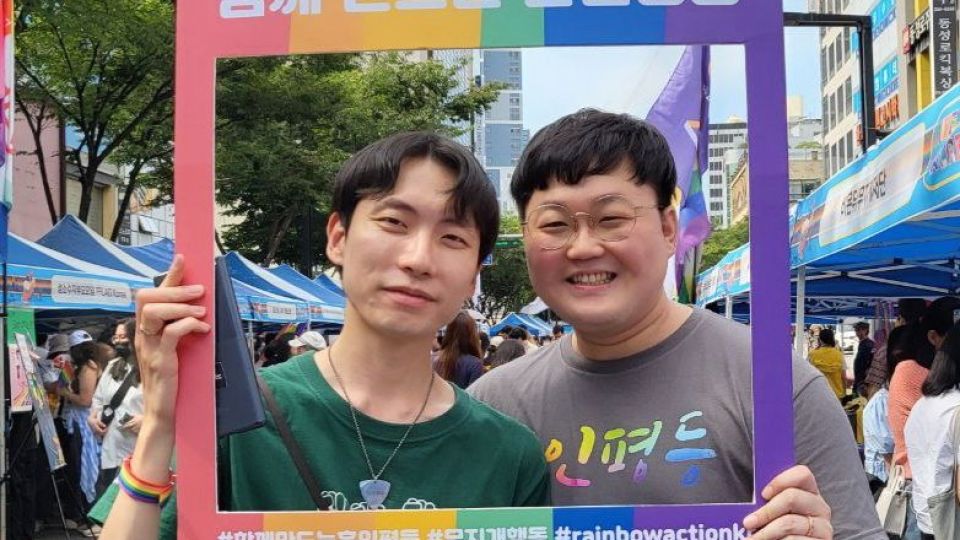June 30, 2023
SEOUL – So Sung-uk, 32, met his spouse Kim Yong-min, 33, 10 years ago when they were fulfilling their alternative military service as social service agents. They fell in love like any other couple, decided to live together, and promised to spend the rest of their lives together.
But the two men faced a series of challenges as a married couple.
Not only did they face a lack of acceptance from their families during the first few years, but they also encountered frequent hurdles in their daily lives because they did not have a legal married status.
They are excluded from support available to married couples and they cannot act as legal guardians to each other. When one of them falls sick, the other can’t get a doctor’s prescription or collect drugs from pharmacies on their behalf.
But discrimination can rear its head in the most quotidian scenes. So describes having to collect court mail with his hands wet from washing the dishes, as Kim was unable to receive it because he is not his legal spouse.
“It might sound trivial, but it clearly shows that same-sex couples cannot have even the smallest right as a couple in Korean society,” he said.
But having watched their parents come to accept their marriage, So and Kim started to believe that Korean society is moving slowly toward legalizing gay marriage.
“We of course had difficulties while preparing the marriage,” said Kim, recalling the moment that Kim told his parents about his decision to marry So five years ago.
“My parents had a hard time, refusing to accept my decision. Only Sung-uk’s mother attended our wedding. But as they watched us living together, my parents gradually changed minds and now they fully support us.”
Miracles did happen to So’s family.
“I came out to my parents when I was a high school student. It was about 15 years ago, and there was less information about sexual minorities back then, so it was not a surprise that they took it hard,” said So.
“But they have become the most ardent supporters for us. Whenever we visit them they prepare warm meals like any other parents would do for their married child.”

So Sung-uk (left) and Kim Yong-min pose for picture, wearing hanbok. (Courtesy of Kim Yong-min)
Kim and So made headlines in March as they became the first gay couple in South Korea to win a court case recognizing a same-sex spouse as a dependent, a ruling celebrated by the LGBTQ+ community as making a significant step toward legalization of same-sex marriage.
Overturning a lower court’s decision, a high court ruled that they are allowed to be covered by the national insurance system on equal terms with heterosexual couples, despite the country not officially recognizing gay couples as marital partners.
The couple sued the National Health Insurance Corp. in 2020 after it deprived So’s status as a marital partner as the agency learned that they were a same-sex couple through a media interview.
Dependents are exempted from paying separately for health insurance. The rule applies to couples of common-law marriage but not to same-sex couples.
“There was a part (in the ruling) that said, ‘Discrimination due to sexual orientation will no longer have a place to stand.’ It was impressive that the judicial branch directly stated that the inappropriate thing is discrimination itself rather than the existence of LGBTQ people,” said So.
“I really appreciated that the court has stated its will to further protect us,” said Kim, referring to another part of the ruling: “Anyone can be a minority in some way, and being a minority is not a wrongdoing. Protecting the rights of minorities is the ultimate duty of the court, the last bastion of human rights.”
The case, however, is awaiting the Supreme Court’s judgment after the Health Insurance Corp. appealed.
In the meantime, the couple said they want others to know that they are just a happily married couple who want the same legal status as other married couples.
“If only they find out that same-sex couples are just ordinary neighbors — who ride the same bus and shop together at the same market — we hope, more people will eventually open up their minds,” said So.

So Sung-uk (right) and Kim Yong-min (Courtesy of Kim Yong-min)
During the court proceedings, Kim and So recalled that they endured hatred and discrimination, but also warm support.
“There was discrimination and hatred in the litigation process of course, but almost all of it was online comments or from extremists who even follow the pride parades to disgrace sexual minorities. We rarely face violence in our daily lives,” said So.
Public perception is changing, so is the judicial system. But political changes are essential for gay rights in Korea, they said.
“The public’s perception is already shifting, but only the political community is not keeping up with it,” said Kim.
Neither the major parties nor the minor parties should turn a blind eye to politics for the socially disadvantaged, including the LGBTQ+, the couple said.
“Solidarity for LGBT Human Rights of Korea once put up an advertisement in several subway stations that read ‘Gender minorities are in your daily life,’ and I think that is what I ultimately wish to say,” said So.
“Regardless of your interest or feelings, we already exist and what we want is just to be ourselves.”
Although the couple said it has been burdensome to live such a public life and participate in lawsuits, they say they will keep on fighting.
“Thanks to many people’s support, and due to the fact that our fight is not just about us, we gained the courage to keep up,” Kim said.


